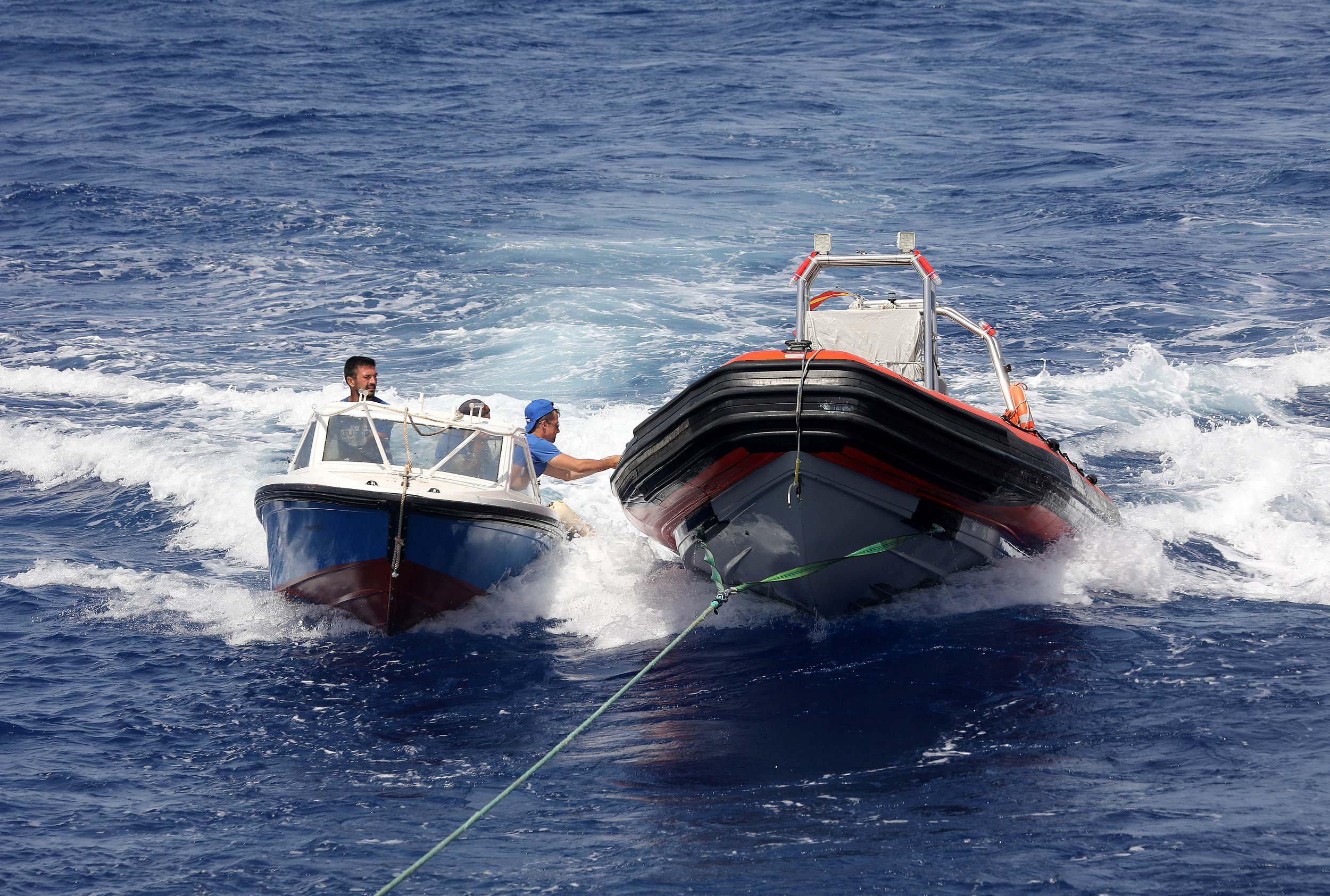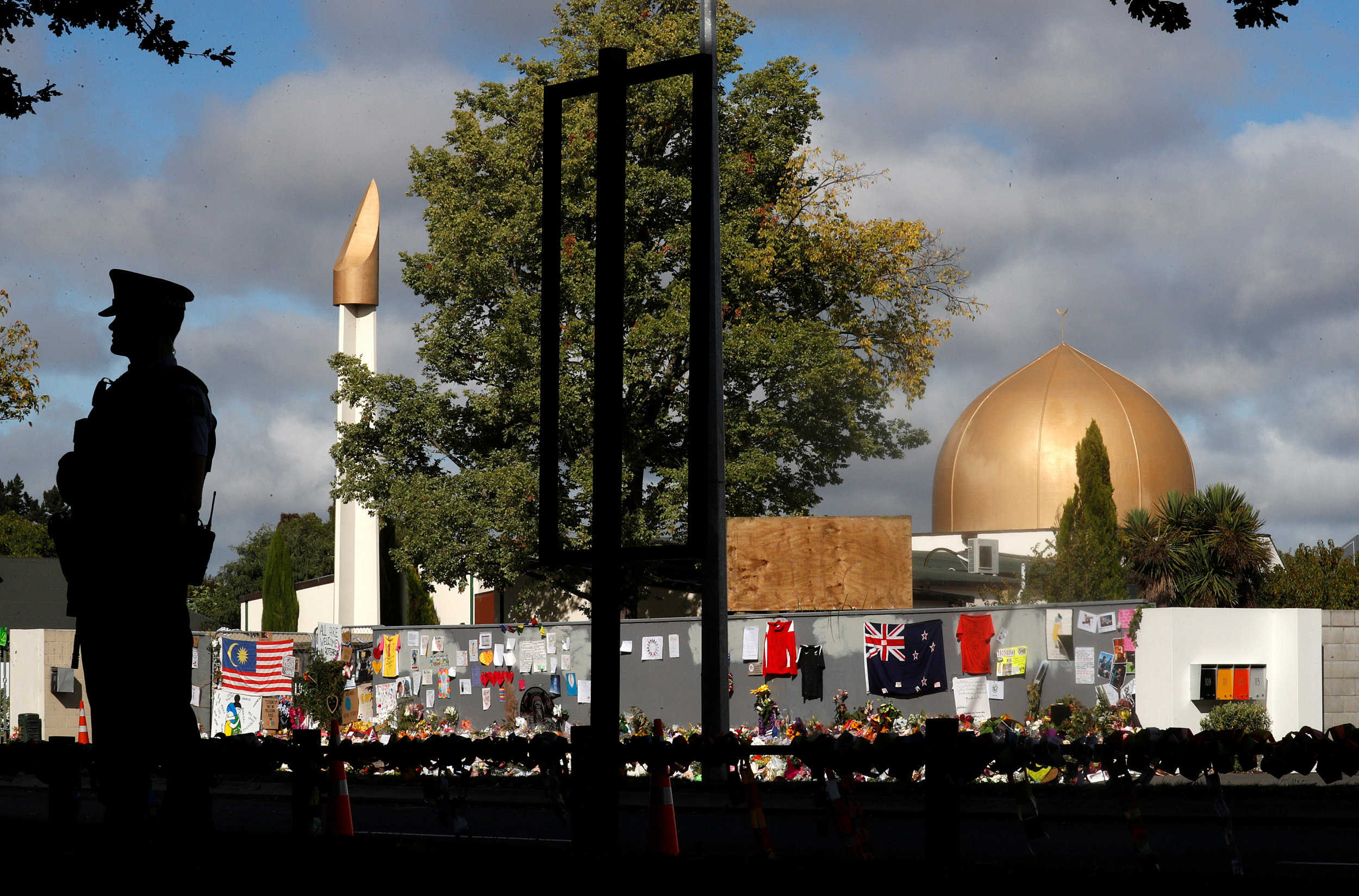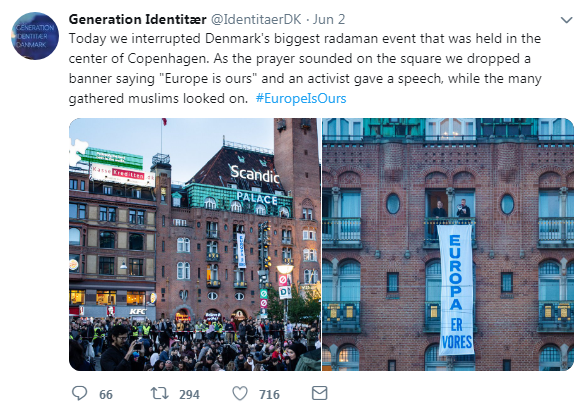

Members of the French group Génération Identitaire carry out an anti-migrant operation at the Col de l'Echelle mountain pass near the French-Italian border, April 21, 2018. /VCG Photo
Identitarians. The name has popped up regularly over the past few months in relation to far-right parties, extremist groups and anti-immigrant attacks.
The Austrian branch was linked to the massacres at two New Zealand mosques earlier this year, and one of its leaders has been deemed persona non grata in the UK. On Thursday, Germany declared it a right-wing extremist group, while in France, several of its members went on trial.
So who are these Identitarians and what do they want?
Who are they?
Also known as Génération Identitaire (Generation Identity), the group was set up in France in 2012. Its stated goal is "to fight against massive immigration and the Islamization of Europe."
Europe's 2015 migrant crisis – when a million people arrived, mainly from Syria and Afghanistan – precipitated the group's actions and it has tried to hinder ships rescuing migrants in the Mediterranean or stop them crossing into France.
While other groups and far-right parties have been equally vocal about the perceived threat from migrants, the Identitarians have had no qualms about using war-like rhetoric to describe their crusade, issuing a video "declaration of war," in which they slam "anti-white racism" and the "forced mixing of races" and advocate cultural homogeneity.

Anti-immigration activists aboard a speed craft try to place "Defend Europe" stickers on a boat of the Proactive Open Arms rescue charity in the Mediterranean Sea, August 15, 2017. /VCG Photo
Even as it rejects immigrants, the group has talked up its social actions helping the "European homeless," which it says are abandoned by a state that prefers to help asylum seekers.
Vocally opposed to globalization and multiculturalism, the "biggest patriotic youth movement in Europe" as it describes itself, has also taken root in Austria, Germany, Denmark and the UK.
On trial
On Thursday, three members of the French branch stood trial in Gap, in the southeast of France, for organizing anti-migrant patrols near the Italian border in early 2018.
As part of an operation dubbed "Defend Europe," the group set out to detain immigrants entering the country illegally and to document any infractions committed by pro-migrant NGOs, according to the prosecution.
About 100 Identitarian members, wearing blue padded jackets and baseball caps and assisted by helicopters and drones, also blocked a mountain pass near the Italian border on April 21, 2018, in a bid to stop illegal immigrants crossing into France.
The group's president Clément Gandelin, spokesperson Romain Espino and a third member have been charged with carrying out activities that could be confused with law enforcement, and face six months in prison and a 7,500-euro (8,500 U.S.-dollar) fine if found guilty.
Incitement to hatred
This is not the first time the Identitarians have ended up in court.
In Austria, 17 members of the local branch were charged with incitement to hatred but found not guilty in July 2018.

A police officer stands guard outside Al Noor mosque in Christchurch, New Zealand, following a deadly attack there, March 22, 2019. /VCG Photo
This followed several actions where they denounced the threat of radical Islam, putting up a fake-blood-stained banner with the words "Islamization kills," storming a university lecture and distributing fake plane tickets to Turks with the words "Safe trip home!"
New Zealand mosque attacks
Generation Identity properly hit the headlines however following revelations that the shooter in the Christchurch mosque attacks in New Zealand in March, in which 51 people were killed, had donated money to the group.
Austrian authorities said a 1,500-euro donation landed in the local branch's account in early 2018. Donations were also reportedly made to the French branch.
The head of the Austrian group, Martin Sellner, admitted to communicating with Christchurch shooter Brenton Tarrant online but condemned the attacks and denied any knowledge or involvement in them.
Austrian police has since conducted several raids on Sellner's properties and seized digital material. He is being investigated on suspicion of belonging to a terror organization.
'A genuine, serious threat'
Efforts to crack down on the Identitarians have multiplied online and offline.
Authorities in Germany have launched investigations and carried out raids against local members. On Thursday, German intelligence classified the group as "right-wing extremists," meaning it can keep them under surveillance.
The UK has barred Sellner from entering the country, deeming him a "genuine, present and… serious threat to the UK's interests."

CGTN screenshot of the Danish Identitarian group's Twitter feed.
Following the New Zealand attacks, the Austrian government said it would look into disbanding the local Identitarian branch.
The French-based International League against Racism and Anti-Semitism (LICRA) has also called for the group to be dissolved, likening it to a private militia.
Much of the group's work is online, where it raises funds for operations like the ones in the Mediterranean or at the French-Italian border, and there too, it has faced recent pushback.
In May, Facebook shut down Génération Identitaire France's page, saying it did not support groups that incite hatred. The German and Austrian pages on Facebook and Instagram soon followed.
The youth movement, whose actions are designed to attract maximum media attention, continues to be active however, with Espino, Gandelin, Sellner and the various national branches regularly publicizing their work on Twitter and denouncing "totalitarian" attempts to silence them.
Identitarians have staged protests in various European cities and on July 20, a rally is planned in the German town of Halle. Last month, Danish Identitarians also staged a loud protest during a Ramadan gathering of Muslims in Copenhagen, chanting "Europe is ours."

Copyright © 2018 CGTN. Beijing ICP prepared NO.16065310-3
Copyright © 2018 CGTN. Beijing ICP prepared NO.16065310-3